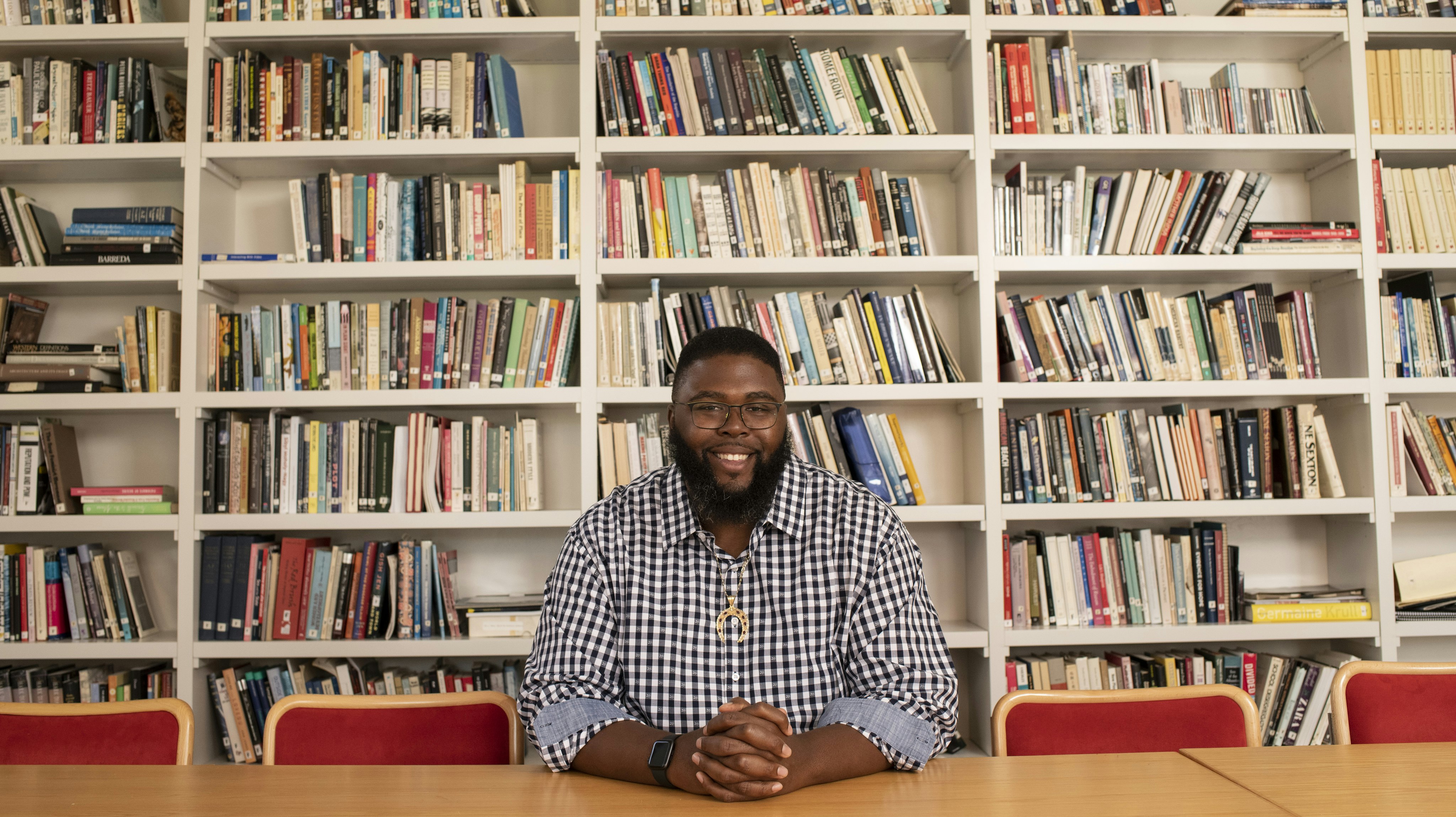COVID and Campus Closures: The Legacies of Slavery Persist in Higher Ed

With his recent research, Anthony Abraham Jack paints a bigger picture of the doubly disadvantaged—students who are low income and from schools in underserved communities.
Anthony Abraham Jack AM ’11, PhD ’16, RI ’22 is a giant of a man, both in stature and spirit. At 6'5" and broad-shouldered, he cuts an imposing figure, yet emanates a tenderness that encourages students to share their stories with him—stories that have shaped his work.
Jack—an assistant professor at the Harvard Graduate School of Education (HGSE) and the Shutzer Assistant Professor at Harvard Radcliffe Institute—is a leading diversity scholar who gained national acclaim for his award-winning first book, The Privileged Poor: How Elite Colleges Are Failing Disadvantaged Students (Harvard University Press, 2019). In it, he examined the divergent experiences of students of color at elite universities who had attended elite private schools through programs like A Better Chance (the privileged poor) with those who had attended local, often under-resourced public schools (the doubly disadvantaged).
Painting a Bigger Picture
According to Jack, qualitative researchers are not usually invited to policy conversations, so when he received funding from the Harvard & the Legacy of Slavery initiative to study how slavery affects the University’s current undergraduates, he proposed to dig deeper.
“I wanted us to have not just analytical leverage but historical power to show how COVID-19 not only wreaked havoc on those from lower-income backgrounds, but also exacerbated the racial inequalities that were already unaddressed on campus,” he says.
His findings and recommendations will be the focus of his second book, When Campus Closed: Inside the Upended World of Elite Colleges (Princeton University Press, forthcoming). In January, Jack topped the junior faculty category on Education Week’s 2023 RHSU Edu-Scholar Public Influence rankings, which “favors scholars who’ve built bodies of work and had sustained impact.”
Zoree Soleil Jones ’24 is one of four students who assisted Jack with the project. While still in high school, she read about his work and hoped that if she got into Harvard, she would have the opportunity to meet him and learn more. The northern Virginia native is not a first-generation college student, but she appreciates Jack’s focus on students who have important stories to tell but haven’t been given the space or visibility to tell them, she says. His work “enables institutions and individuals within institutions to think more critically and comprehensively about how best to construct policies that are really centered around care and around being receptive and responsive” to students’ needs, she adds.
Jack and his team of graduate students at the HGSE interviewed 125 Asian, Black, Latino, white, and Native undergraduate students from Harvard about where they were on March 10, when Harvard said that it would close its doors; as the nation prepared to lock down; and on the day that they learned about the murder of George Floyd. He asked about their transition to college and what they thought about the racial climate on Harvard’s campus. How were they and their families faring during the pandemic?
The Power of Place
Jack shares the experiences of two runners under lockdown: Hannah, who is white and from an affluent California community, and Samantha, a Latina from a low-income town near Toledo, Ohio. While Hannah joyfully ran through redwoods in national and state parks emptied by the pandemic, Samantha was confined to a nearby quarter-mile radius of asphalt that she lapped, fearful of straying too far from home because of the violence and crime that is typical of poor neighborhoods like hers.
“In this work, I interrogate students’ relationships with their communities during their exits from campus to underscore the power of place not only in students’ lives but also in the practices of the colleges and universities that recruit them,” Jack explains. “COVID-19 is an unerring mirror reflecting back upon America a depressing and unequal country, and so much of what troubles the truly disadvantaged is the place of risk.”
He could easily relate to some of the struggles recounted by Black students from low-income communities because their experiences were similar to those he faced during his undergraduate years at Amherst College, such as the need to provide financial support for his family. Or the periods when he experienced hunger while on campus during breaks because he couldn’t afford to go home, and the dining halls were closed. During his junior year at Amherst, after Jack made the president and dean of students aware of how dining hall closures affected students forced to remain on campus during breaks, Amherst created a special fund that provided students with $30 a day to eat at a café on campus that remained open.
Jack wasn’t surprised by how open students were during interviews, but he was struck by how deeply personal some of the conversations became. “Sometimes, in the first five minutes, I learned about sexual assault, abuse, suicidal ideation,” he recalls. “It usually takes two or three interviews for you to get a certain detail that tells the entire story. But these students were like, no. They needed someone to talk to. They were home. They were distanced from campus, and they were like, I need to talk to somebody.” One interview lasted seven hours.
“Professor Jack’s authenticity is his superpower,” says Jones.
“Anyone who speaks with him would be struck by his sincerity and devotion to honoring the lived experiences of the individuals he interviews,” Jones adds. “This is always front and center. This authenticity and sincerity invites others to do the same, and I believe that it’s a driving factor behind why students feel comfortable sharing their stories with him. At the same time, he is a deeply empathetic listener who ensures that students feel both seen and heard. When you speak to him, you can tell that every word, every idea that you share, matters.”
A Different World
Before entering college, Jack began his school with Head Start and then attended Miami-based public schools until his senior year, which he spent at Gulliver Prep, a private school devoted to “educational excellence.” It was eye-opening. At Gulliver, he was exposed to the kind of flashy wealth synonymous with Miami; suddenly, he was engaging with families whose net worth was in the millions and owned homes with multiple levels, bathrooms, and pools. For many of these people, work that wasn’t conducted in a corner office in an executive suite was disparaged.
Jack explains, “I’ll never forget this. When I was at Gulliver, one of the dads said to his son, ‘When you buy your own car—your own Mercedes or Range Rover—don’t buy it in black because they’ll just think you’re the driver,’” Jack says. “God forbid, right?”
That kind of exposure helped him later to navigate the “New England, old-school money” that he encountered at Amherst College as an undergraduate. There, he observed friends from backgrounds similar to his but who were interacting for the first time with a majority white group of classmates. They had no idea what professors’ office hours were. They were the students who were more likely to take time off, not because of the academic work but because of all-consuming stress at home.
“It ate at me, too, in different ways. I’ve kind of always been the financial crutch for my family; I was always the person who was sending money home. It’s just a reality of what it means to be a first-gen for many of us,” Jack said. “There were some students who struggled with that juggling act. It’s a very real one that I hope my work speaks to and gives us a better understanding of.”
The challenges that he and other first-generation students of color faced and the way that scholars typically wrote about the experiences of these students have inspired Jack’s scholarship.
“When I was in graduate school, I was reading all this stuff about culture and higher education, and they’re talking about lower income students, and it’s almost right—it’s half right. Something isn’t sitting well with me about how other scholars have for decades written about first-generation and lower-income students,” Jack recalls.
“What my own experiences did was remind me that not everyone’s story is included, and worse: sometimes our stories that are included are told incorrectly,” Jack says. That inspired him to move beyond stereotypes about what it means to be Black and poor and focus instead on how the college experience exacerbates the differences between first-generation students and those whose parents are college graduates.
The Whole Truth
Jack hopes that When Campus Closed will lead all institutions of higher education to turn their attention to structural inequities that students must deal with on campus and at home. He would, for example, like colleges and universities to revise their academic leave policies. Some selective private colleges place heavy burdens on students who are asked to take academic leave. They must, for example work a full-time job or take on a full-time course of study and seek letters of recommendation during that period. Students who elect to take academic leave face none of these requirements and continue to have access to university resources. The paradox is that the students who are asked to leave are more often returning to insecure communities and households where often more people are unemployed than not.
The fact that elite colleges and universities are not reckoning with their students' home communities disadvantages these students before, during, and after college.
“If you come from a community that already wrestles with unemployment and if you are not only the first person in your family but one of the few people in your community who has gone to college, who’s writing letters of recommendation for you?” he asks. Requiring students to take on these burdens goes against the core purpose of taking an academic leave—a period during which students need more support, not less. “Make it make sense,” Jack laments, which is exactly what his When Campus Closed research aims to do.
In addition to increasing the number of mental health counselors who are available 24 hours a day, Jack believes that these professionals must also be trained on how structural inequalities, like segregation, manifest themselves on campus. They should be cognizant of which students are more likely to get that dreaded middle-of-the-night call with a request to send money home—or worse, news of a gun violence–related tragedy. Career services need to understand why some students can’t afford to do unpaid internships and find ways to support them so that they can participate in invaluable opportunities that could lead to a job after graduation.
After hearing Jack speak at the Jack Kent Cook Foundation in Leesburg, Virginia, about seeking help and how therapy has helped him, a group of students who had committed to Harvard and MIT made a pact to sign up for therapy by the end of the first month on campus, which they did.
“I don’t want inspiration for that to be just a happenstance of meeting and hearing me speak. I want the University to put it at the forefront of all the things they offer,” he said. “We will never serve our students fully or match the promises made in those admission letters until we better understand the communities that students come from and return to—both the privilege and the poverty.”








